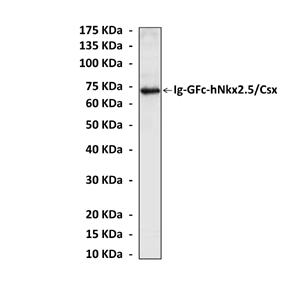Anti-Nkx2.5: Mouse Nkx2.5/Csx Antibody |
 |
BACKGROUND The homeobox gene Nkx2.5 (also called Csx) is the earliest known marker of vertebrate heart development. It has a sequence homology to the Drosophila tinman, which is required for the dorsal mesoderm specification. It belongs to the NK-2 homeobox family and contains 1 homeobox DNA-binding domain. Heterozygous mutations of this gene were found to cause human congenital heart disease. It was demonstrated that Nkx2.5 is implicated in commitment to and/or differentiation of the myocardial lineage. It interacts with the C-terminal zinc finger of GATA4 through its homeobox domain and acts as a transcriptional activator of ANF in cooperation with GATA4. It also interacts with JARID2 which represses its ability to activate transcription of ANF. In addition, it interacts with FBLIM1 as well as with HIPK1 and HIPK2, but not HIPK3.1 The minimal DNA binding consensus for Nkx2.5 contains a 5'-TNNAGTG-3' sequence motif. Nkx2.5 regulates expression of several essential transcription factors in the developing heart. It was shown that mutant mice embryos completely null for Nkx2.5 showed arrest of cardiac development after looping and poor development of blood vessels. Moreover, there were severe defects in vascular formation and hematopoiesis in the mutant yolk sac. Interestingly, TUNEL staining and PCNA staining showed neither enhanced apoptosis nor reduced cell proliferation in the mutant myocardium. Nkx2.5 is required for later differentiation of cardiac myocytes. Thus it is primarily known as a positive regulator of cardiac development and inducer of cardiomyocyte differentiation.2 Nkx2.5 is highly expressed in the adult and embryonic heart and to a less extent in lingual muscle, spleen, stomach and lung as well. However, little is known about its function outside the heart. It was shown that Nkx2.5 acts as a suppressor of α-SMA gene expression, and thus myofibroblast differentiation.3 Defects in NKX2-5 are the cause of atrial septal defect with atrioventricular conduction defects (ASD-AVCD) and also the cause of tetralogy of Fallot (TOF) and congenital hypothyroidism non-goitrous type 5 (CHNG5).4
REFERENCES
1. Schwartz, R.J. & Olson, E.N.: Develop.126:4187-92, 1999
2. Pashmforoush, M. et al: Cell 117:373-86, 2004
3. Hu, B. et al: Am. J. Respir. Cell Mol. Biol. 42:218-26, 2010
4. McElhinney,D.B. et al: J. Am. College Cardiol.42:1650-55, 2003
2. Pashmforoush, M. et al: Cell 117:373-86, 2004
3. Hu, B. et al: Am. J. Respir. Cell Mol. Biol. 42:218-26, 2010
4. McElhinney,D.B. et al: J. Am. College Cardiol.42:1650-55, 2003
Products are for research use only. They are not intended for human, animal, or diagnostic applications.
Параметры
Cat.No.: | CP10186 |
Antigen: | Purified recombinant human Nkx2.5 fragments expressed in E. coli. |
Isotype: | Mouse IgG1 |
Species & predicted species cross- reactivity ( ): | Human |
Applications & Suggested starting dilutions:* | WB 1:1000 IP n/d IHC n/d ICC n/d FACS n/d |
Predicted Molecular Weight of protein: | 35 kDa |
Specificity/Sensitivity: | Detects Nkx2.5/Csx proteins without cross-reactivity with other family members. |
Storage: | Store at -20°C, 4°C for frequent use. Avoid repeated freeze-thaw cycles. |
*Optimal working dilutions must be determined by end user.
Документы
Информация представлена исключительно в ознакомительных целях и ни при каких условиях не является публичной офертой








